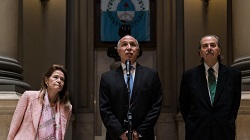With the creation of several new databases, Argentina’s judiciary appears intent on creating greater transparency when it comes to organized crime and corruption cases, as combating organized crime becomes a more prominent priority on the country’s political agenda.
On February 16, President of the Argentine Supreme Court Ricardo Lorenzetti told a group of federal judges that the court, along with other judicial bodies, would create three open databases on organized crime cases, reports La Nacion.
One database will name all individuals charged in corruption cases, a second will cross-reference charges for drug trafficking in both closed and open cases, and a final registry will focus on on femicides and human trafficking. According to Infobae, the registries will become active in March. Lorenzetti did not provide details on how citizens would access these databases, reported Pagina 12.
Lorenzetti also said that while the databases will contain information on ongoing cases for the sake of greater transparency, users should nevertheless respect “the presumption of innocence and due process.”
InSight Crime
Fighting organized crime, and specifically drug trafficking, has become an increasingly important issue on Argentina’s political agenda, and in some ways the judicial branch has been leading the way in calling attention to the problem.
The Argentine judiciary has long criticized what they say is lack of government action against organized crime. In a report released in 2015, Argentine prosecutors cited their growing concern over the proliferation of drug trafficking activity throughout the country. In late 2015, the Supreme Court created a new judicial commission meant to help guide a more effective national drug policy.
SEE ALSO: Coverage of Argentina
While announcing the new transparency measures, Lorenzetti himself observed that most drug cases that end up in Argentina’s courts have to do with consumers, rather than large-scale drug trafficking organizations and their corrupt networks. “This is a trend that has to change,” he said.
The executive branch appears to following the judiciary’s lead in pushing for a more aggressive anti-organized crime strategy. In January, newly-elected President Mauricio Macri announced the implementation of a national security emergency, granting security forces special powers like the shoot-down of suspected drug flights.

